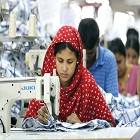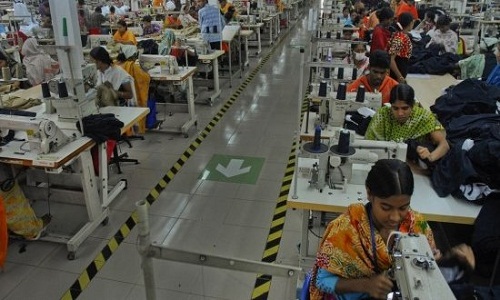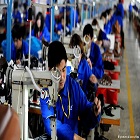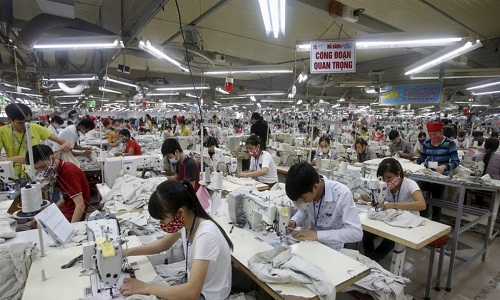FW
"Experts feel Bangladesh might lose its competitive edge in global apparel business after the signing of the trade pact. Their exporters may face an uneven and tough competition. TPP is aimed at cutting trade barriers and setting common standards for 12 countries. More than 18,000 taxes imposed by various countries on the US products will be eliminated under it, when it comes into effect."

Bangladesh needs to revamp its trade policy so that it can be better prepared to face the situation that may herald the beginning of a new era of trade liberalisation globally through 'mega-regional' agreements. The fear about Bangladesh finding itself in a situation where it loses its current position as the world's second largest apparel exporter is quite worrying, feel experts. World’s one of the biggest multinational trade deals TPP was signed by 12 member nations in New Zealand recently but the trade pact will require years of tough negotiations before it becomes a reality. The deal, which will cover 40 per cent of the world economy, has already taken five years of negotiations to reach the signing stage. Analysts say the massive trade pact will still require years of tough negotiations before it becomes a reality.
Bangladesh might lose competitive edge

Experts feel Bangladesh might lose its competitive edge in global apparel business after the signing of the trade pact. Their exporters may face an uneven and tough competition. TPP is aimed at cutting trade barriers and setting common standards for 12 countries. More than 18,000 taxes imposed by various countries on the US products will be eliminated under it, when it comes into effect. The deal could reshape industries and influence everything from the price of cheese to the cost of cancer treatments.
Currently, Bangladesh garment exports to the US are subject to 15.62 per cent duty that are paid by the importers there, whereas Vietnam's RMG exports are subject to only 8.38 per cent import duty. The deal will make Vietnam's garment exports to US completely duty-free. Whereas, Bangladesh's duty-advantage on garment exports to some other TPP member-countries - Canada, New Zealand, Japan, Australia and Chile - might also be affected by the new trade deal.
FDI may take a back seat
Analysts feel that investment decisions by global entrepreneurs will furthermore be effected by the new trade deal, making countries like Vietnam a stronger candidate as the preferred destinations, due to their zero-duty access to the markets of other TPP countries. Considering this, it is crucial for Bangladesh to reduce the cost of doing business to maintain the country's competitiveness in international trade. It should also look for opportunities to join such a mega deal, as some other countries are also reportedly planning to do so.
Moreover, Bangladesh needs to focus on new international markets, particularly those where its exports enjoy duty benefit. Diversification of the country's apparel items is another critical area for more value addition. Productivity in factories has to be raised to cushion against any probable losses in garment exports.
According to a study, if TPP adopts flexible rules of origin on sourcing, as favoured by Vietnam, it could boost its share of the growing apparel market from 4.0 per cent to 11 per cent, while Bangladesh's share in this market has remained almost static -- between 7.0-8.0 per cent. Currently, Vietnam is at a comparative disadvantage in the RMG sector mainly due to its higher costs of production including higher wages.
Until now, Bangladesh has been able to retain its edge in the sourcing world in spite of the higher import tariff on its export than those of Vietnam. But it is likely that TPP, when it comes into force, will trigger some trade diversion from Bangladesh to Vietnam. Bangladesh needs to pay special attention to the implications of the TPP and other incoming free-trade deals that are shaping the '21st-Century Trade Policies'.
If Bangladesh takes appropriate moves to be involved with TPP in one form or other, it may find its niche in textiles, leather and services. Otherwise, there is a possibility for a potential slowdown in the growth of its RMG sector. Certainly, long-term impacts of the TPP on the Bangladesh economy will be more important than short-term ones. Joining any effective regional initiative can provide some cushion to Bangladesh in the long term to stay competitive in the global economy.
Pakistan Readymade Garments Manufacturers & Exporters Association (PRGMEA) will hold the 15th Textile Asia 2016 International Textile & Garment Machinery Trade Fair incorporating Clothing, Fabric & Textile Asia in Karachi in collaboration with Ecommerce Gateway . Termed Pakistan’s biggest B2B textile, garment, embroidery, digital printing machineries and chemical and allied services, the 3-days trade fair will be held from March, 09-11, 2016.
The trade fair will provide an effective podium for joint ventures/ collaborations to the textile SMEs and provide a platform to its international participants to meet respective Pakistani business personals to make future business leads in Pakistan.
The event will focus on the immense buying selling potential of textile and garment industry and poised to introduce overseas suppliers of textile and garment materials, accessories and parts and machinery to the textile industry of Pakistan. This will complement their efforts for high quality, value added products and assist them to further develop their business in the export markets.
The trade fair will have more than 550 International Brands displaying their products in over 700 booths and over 500 foreign delegates mainly from Austria, China, Czech Republic, France, Germany, India, Italy,Korea, Taiwan, Turkey, UK,USA etc. will grace the event.
The organizers are expecting a visitor turnout of over 65,000 during the event.
Vietnam’s strong fashion brands have gone downhill as they cannot compete with foreign brands. Brands like Foci, Sea, Sifa, N&M, Viet Thy, Dan Chau and Sanding, have fallen into oblivion. Many garment companies, which vowed to conquer the domestic market in the ‘return home’ movement, have given up and shifted to making products for export.
According to Pham Xuan Hong, General Director of Saigon Gon 3 Garment Company, a big exporter, the company has set up several showrooms in HCM City, but they have been taking losses. The domestic market has been very difficult to exploit, even for experienced producers of garments for export.
Exporters, who decided to focus on conquering the domestic market some years ago, as export markets shrank in the global economic crisis, have spent big money to develop their distribution networks. However, results remain unsatisfactory, even though the companies have good production workshops, labor force and technologies.
Manufacturers say, they are pessimistic about the domestic market, especially when TPP takes effect, under which import tariff will be cut to zero per cent. According to the Vietnam Textile and Garment Group (Vinatex), only 20 per cent of garment companies are keen on the domestic market, and have reserved 20-25 per cent of their capacity to make products for domestic consumption. They are focusing on making products for export.
Itema is the largest privately owned multinational company and global leading provider of best-in-class weaving machines, spare parts and services. It is first and foremost a rapier terry loom manufacturer. The brand’s new R9500 terry is a racehorse when it comes to terry weaving. What makes the R9500 terry an extraordinary weaving machine for terry weavers is the sturdy structure and reliable mechanical components and the exceptional textiles results obtained due to an extensive and thorough R&D work. Unparalleled textile quality is guaranteed by a winning trio of innovative devices: the new positive pile back-rest roller, the new pile formation unit and the new ground back-rest roller.
The A9500p is its best-in-class airjet machine. It is equipped with a new and innovative feature: the double tandem nozzles, which ensure enhanced machine efficiency and superior fabric quality. The nozzles guarantee a perfect distribution of the pushing force on the weft using a lower air pressure, thus leading to a double benefit: reduced stress on the yarn allowing top fabric quality and, at the same time, the possibility to weave with a lower pressure ensuring energy saving.
The rapier weaving machine R9500p is the perfect machine in segments such as denim and shirting due to its best-in-class technical advancements which guarantee unbeatable performances, speed and versatility.
www.itemagroup.com/
Bangladesh’s export earnings from the United Kingdom in the first seven months of the financial year 2015-16 witnessed a robust growth of 22.59 per cent. Export earnings growth remained negative in major markets like Belgium, Denmark, Italy, Netherlands and China while earnings witnessed encouraging growth in the United States and India. Earnings from China in the first seven months fell by 8.07 per cent.
Readymade garment exports to the UK grew by 26.10 per cent in the period. Bangladesh’s export is mostly demand-driven. Building supply side capacity is important to achieve demand-driven export growth in the global market.
Earnings from Germany remained almost the same in the first seven months while Belgium and Denmark witnessed a negative growth of 7.60 per cent and 4.43 per cent respectively. Earnings from Spain grew by 12.24 per cent while exports to France increased by 3.52 per cent.
Export earnings from Sweden remained almost the same while Italy and the Netherlands witnessed a 2.21 per cent and 1.86 per cent negative growth. Earnings from the US grew by 13.5 per cent while readymade garment exports to the US grew by 12.6 per cent. Earnings from India grew by 27.26 per cent while readymade garment exports to India grew by 15.11 per cent.
Bangladesh’s overall export earnings in the July to January period of financial year ’16 showed a 8.26 per cent rise.
Cotton prices in India will stay under pressure in financial year 2017 as volumes are unlikely to match Chinese demand. The continuation of Chinese direct subsidy-based policy and lower demand from spinning mills will keep domestic cotton prices under pressure.
Though Bangladesh, Pakistan and Vietnam have replaced China with India as a supplier, volumes are picking up at a slow pace and are unlikely to match Chinese demand. The operating margins will stay in the one to two percent range for ginners and traders, but the profit after tax margins may improve as sector companies reduce stocks and focus on receivables management.
The cotton industry is likely to revive moderately in financial year ’17 as exports to Vietnam, Pakistan, and Bangladesh grow. Vietnam is likely to increase its spindle capacity by 30 per cent. The local cotton production in Pakistan and Bangladesh is unable to keep pace with the increasing demand for apparels from these locations, providing opportunities to Indian exporters.
However, in view of China reducing imports significantly, and the moderating demand from Indian spinning mills, the demand for cotton will increase at a marginal rate and prices are unlikely to increase materially from the current levels.
French luxury goods company LVMH’s revenue increased 16 per cent in 2015. The fashion and leather goods sector, the company's largest division, registered particularly good performance. LVMH is the world’s largest luxury goods company. It owns brands like Christian Dior, Bulgari, TAG Heuer, De Beers, Louis Vuitton and Dom Perignon.
Louis Vuitton accounts for the bulk of the division’s sales and profits. Jewelry sales represent about a third of the group’s watch and jewelry unit. Its fashion brands Marc Jacobs and DKNY are in the middle of a thorough reorganisation. Weak euro and strong sales in LVMH’s wines and spirits division – home to brands including Moët and Hennessy – have more than made up for slower growth in the fashion business.
However, the Chinese market is posing a problem for global luxury brands. There been a fall in luxury buying in China. The country’s luxury sector has been hit by a slowing economy and a three-year-long anti-corruption and anti-extravagance political campaign. Apparently overly optimistic growth and consumption projections for China have misled foreign investors. Some of LVMH’s stores in China have closed down. And it just so happens that this is the most recognised high-end brand in China.
www.lvmh.com/
"The strong performance of garment exports in Vietnam, Bangladesh and Cambodia has not been replicated across all of Asia's economies that rely heavily on apparel earnings. China, the continent's behemoth in apparel exports, finally seems to be feeling the impact of rising domestic costs. Myanmar, an important emerging player in the sector, also had a mixed year, with strong growth in apparel export volumes being offset by a steep depreciation of the local currency, the kyat, resulting in a drop in the US-dollar value of garment earnings."

Garment exporters in the Asian region by and large outperformed their rivals across the globe. Most of these countries occupy the lower end of the apparel value chain but the RMG sectors stable performance has highlighted its importance in the development of these emerging markets. According to estimates, last year was not too good for many Asian exporters. However, while commodities and electronics exporters suffered, apparel sector did remarkably well.
Apparel exports outperform

During last year, apparel exports remained a bright spot for many countries. In Bangladesh for example, exports rose by 6.5 per cent on average in 2015, and in Vietnam they were up by 8 per cent. A key growth driver in both instances was the strong expansion in exports of apparel. Readymade garments accounted for 69.6 per cent of Bangladesh's exports in the first 11 months of 2015, according to data from Bangladesh Bank, and increased by 6.1 per cent year on year over that period in local-currency terms. Vietnam government data show textiles and garments made up 14.1 per cent of total exports in 2015 but they increased strongly at 9.6 per cent in the year.
In Cambodia too, apparel sector dominates exports but has faced challenges over the past couple of years due to labour unrest and surging wages. However, here too, the garment sector played a role in supporting overall exports in 2015. According to National Bank of Cambodia data, total garment exports were up by 10.6 per cent year on year in US-dollar terms in the first three quarters of 2015, aided by more stable industrial relations.
The strong performance of garment exports in Vietnam, Bangladesh and Cambodia has not been replicated across all of Asia's economies that rely heavily on apparel earnings. China, the continent's behemoth in apparel exports, finally seems to be feeling the impact of rising domestic costs. Myanmar, an important emerging player in the sector, also had a mixed year, with strong growth in apparel export volumes being offset by a steep depreciation of the local currency, the kyat, resulting in a drop in the US-dollar value of garment earnings.
Asia leads global garment market
US government's Office of Textiles and Apparel (OTA) data show that US imports of apparel products amounted to $103.8 billion for the first 11 months of 2015, and Asian suppliers accounted for roughly three-quarters of this total. China's share of the US market remains highest, at 38.8 per cent but it was down from 39.1 per cent in the same period of 2014. The share of apparel and garment imports from members of the Association of South-East Asian Nations (ASEAN), by contrast, edged up to 19.7 per cent in January–November 2015, from 19.2 per cent in the year-earlier period. This was largely owing to higher imports from Vietnam: other ASEAN nations such as Indonesia, Thailand and the Philippines lost market share.
The share of South Asian economies in US garment and textile imports was close to that of ASEAN, at 15.4 per cent. India's garment and textile exports to the US rose by 8.8 per cent year on year in January–November 2015, while those from Sri Lanka were up by 16 per cent. (Bangladesh's exports to the US, up by 11.7 per cent, were more in line with the overall domestic apparel export performance.) The region's biggest disappointment was Pakistan, where exports of both apparel and textiles to the US fell as demand shifted more to synthetic fibers.
Exchange rates may shake up things
Within Asia and other emerging markets, the big shifts in currency exchange rates in recent months will probably have a significant impact on apparel trade in the next few years. Margins in the sector tend to be narrow, and currency movements can have a significant effect on national competitiveness.
However, many of the underlying trends evident in 2015 look set to continue. China's rising domestic costs are unlikely to be fully offset by the depreciation of the Yuan expected to in 2016. Garment sectors in India and Sri Lanka will continue to struggle with lackluster EU demand in the next few years but their rising sales in the US will provide some offsetting support. The rise of apparel producers in Bangladesh and Vietnam has been evident for several years, and there is no sign that their share of the global market will peak in the near future.
However, mid-tier producers in countries like Cambodia, Indonesia, the Philippines, Thailand and Pakistan will have to do more to match their rivals in this increasingly tough market. Prospects for the garment sector in all five countries look fragile, particularly as new and even cheaper countries like Myanmar emerge as potential sites for production. Apparel exports may be holding up better than those of commodities and electronics, but competition in the sector remains brutal.
Catering mainly to traditional markets like the US and Europe, Tirupur-based Alfine Knit, is now exploring new markets like Russia and Australia. For this, the company is taking part in sourcing fairs. It has a decent number of clients from several countries across the world. Very strong in knits as well as in woven men’s wear, Alfine Knit started doing business with South Africa last year. Supplying mainly to chain stores and private brands, it has a total of 800 stitching machines to work with, and out of them 600 are generally used for woven products.
In this season, the brand is focused on washes and indigo jersey. The company aims at around 15 per cent growth each year and has succeeded to that effect through the past 10 years. Alfine offers value-added products. In terms of capacity, it can offer 10,000 pieces of basic products per day. The company has also invested in printing and dyeing.
The brand’s strength is in its diversity and complicated products in terms of design or product development. It has an office in New York and works with both American and Indian designers.
The parent company is the Chennai-based Jak industries.
India has started a probe into the alleged dumping of spandex yarn from China, South Korea, Taiwan and Vietnam. The probe will determine the existence, degree and effect of the alleged dumping and recommend the amount of anti-dumping duty which if levied would be adequate to remove any injury to the domestic industry.
Elastomeric filament yarn is commonly referred to as spandex or elastane. In common parlance, these yarns are also referred to as Lycra, even though Lycra is a specific brand name. Spandex yarn is mainly used to make garments that require great comfort and fit. It finds applications in manufacturing of hosiery, swimsuits, aerobic or exercise wear, ski pants, golf jackets, disposable diapers and waist bands, among others.
Countries initiate an anti-dumping probe to determine whether their domestic industries have been hurt because of a surge in cheap imports of any product. As a counter measure, they impose duties under the multilateral regime of the WTO.
The duty is aimed at ensuring fair trading practices and creating a level-playing field for domestic producers vis-a-vis foreign producers and exporters resorting to dumping of goods at below-cost rates. The complaint of dumping was lodged by Indorama Industries.












